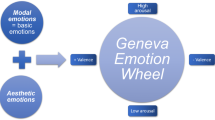Abstract
This article is a forum response to a research article on self-reporting methods when studying discrete emotions in science education environments. Studying emotions in natural settings is a difficult task because of the complexity of deciphering verbal and non-verbal communication. In my response I present three main points that build on insights mainly from philosophy and anthropology. The three points are: first, the significance of connecting the visible and measurable with the invisible and intangible; second, what it means to think about the practices of knowing; and third, an argument to map out a geography of analysis that takes also into account who or what emotions are directed at.
Similar content being viewed by others
References
Bourdieu, P. (1990). The logic of practice. Stanford: Stanford University Press.
Cowie, B., Moreland, J., & Otrel-Cass, K. (2013). Expanding notions of assessment for learning: Inside science and technology primary classrooms. Rotterdam: Sense Publishers.
Darwin, C. (1998). The expression of the emotions in man and animals (Introduction, afterword and commentaries by Paul Ekman). Oxford: Oxford University Press (Original work published in 1872).
Evans, J. (2002). Adults’ mathematical thinking and emotions: A study of numerate practice (Vol. 16). London: Routledge.
Goodwin, M., Cekaite, A., & Goodwin, C. (2012). Emotion as stance. In M.-L. Sorjonen & A. Perkyla (Eds.), Emotion in interaction (pp. 16–41). Oxford: Oxford University Press.
Goodwin, M. H., & Goodwin, C. (2000). Emotion within situated activity. In N. Budwig, I. C. Uzgiris, & J. V. Wertsch (Eds.), Communication: An arena of development (pp. 33–53). Stamford, CT: Ablex.
Ingold, T. (2000). The perception of the environment: Essays on livelihood, dwelling and skill. Milton Park, Abingdon, Oxon: Routledge.
Ingold, T. (2011). Being alive: Essays on movement, knowledge and description. Milton Park, Abingdon, Oxon: Routledge.
Mahmoud, M., & Robinson, P. (2011). Interpreting hand-over-face gestures. Affective Computing and Intelligent Interaction: Lecture Notes in Computer Science, 6975, 248–255. doi:10.1007/978-3-642-24571-8_27.
Merleau-Ponty, M. (1968). The visible and the invisible: followed by working notes. Evanston: Northwestern University Press.
Otrel-Cass, K., Cowie, B., Moreland, J., & Jones, A. (2009). Teachers and researchers working together: A subject specific planning framework as a boundary object. In P.- Masson & M. Pilo (Eds.), Partnership in education: Theoretical approach and case studies (pp. 128–152). Lille Cedex: The Book Edition. Com.
Rogoff, B. (2003). The cultural nature of human development. Oxford: Oxford University Press.
Roth, W.-M. (2008). Bricolage, métissage, hybridity, heterogeneity, diaspora: Concepts for thinking science education in the 21st century. Cultural Studies of Science Education, 3, 891–916. doi:10.1007/s11422-008-9113-1.
Author information
Authors and Affiliations
Corresponding author
Additional information
Lead Editor: C. Siry.
This article is part of the Special Issue on Research on Emotions of Science Education.
This review essay addresses issues raised in Stephen Ritchie, Peter Hudson, Alberto Bellocchi, Senka Henderson, Donna King and Kenneth Tobin’s paper entitled: Evolution of self-reporting methods for identifying discrete emotions in science classroom. doi:10.1007/s11422-014-9607-y.
Rights and permissions
About this article
Cite this article
Otrel-Cass, K. Towards a geography of emotional analysis. Cult Stud of Sci Educ 11, 595–602 (2016). https://doi.org/10.1007/s11422-015-9693-5
Received:
Accepted:
Published:
Issue Date:
DOI: https://doi.org/10.1007/s11422-015-9693-5




